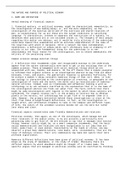THE NATURE AND PURPOSE OF POLITICAL ECONOMY
I. NAME AND DEFINITION
Verbal meaning of financial aspects
1. Financial matters, or political economy, might be characterized, momentarily, as
the investigation of men making money; or, all the more completely, as the
investigation of the material world and of the exercises and shared relations of
men, so exceptionally far as all these are the target conditions to satisfying
longings. To characterize, intends to separate the restrictions of a subject, to
determine what questions are or are excluded inside it. The thoughts of most people
regarding this matter are dubious, yet it would be truly alluring if the understudy
could move toward this examination with an accurate comprehension of the idea of
the inquiries with which it bargains. Until a subject has been contemplated,
nonetheless, a definition in simple words can't enormously help in stamping it off
plainly in our idea. The fundamental thing for the understudy is to see
unmistakably the focal reason for the investigation, not to choose immediately the
entirety of the perplexing cases.
Common sciences manage material things
2. A definition that recommends clear and recognizable musings to the understudy
appear from the outset substantially more hard to get in any sociology than in the
common sciences. These arrangement with solid, material things which we are
acquainted with see, handle, and measure. On the off chance that a simple youngster
is informed that organic science is an investigation wherein he may find out about
blossoms, trees, and plants, the appropriate response is genuinely fulfilling, for
he without a moment's delay considers numerous things of that sort. When, in like
way zoölogy is characterized as the investigation of creatures, or geography as the
investigation of rocks and the earth, the words call up recollections of numerous
natural articles. Indeed, even so troublesome and unfamiliar looking a word as
ichthyology is by all accounts clarified by the explanation that it is the name of
the investigation wherein one finds out about fish. The facts confirm that there
might be some misconception with regards to the manner by which these subjects are
considered, for organic science isn't in the primary to instruct how to develop
plants in the nursery, nor ichthyology how to get fish or to engender them in a
lake. However, the primary motivation behind these investigations is clear at the
start from these straightforward definitions. In fact, as the investigation is
sought after, and information broadens to take in the complex and different types
of life, the limits of the uncommon sciences become not all the more but rather
less sharp and clear.
Financial aspects concentrates some friendly demonstrations and relations
Political economy, then again, as one of the sociologies, which manage men and
their relations in the public arena, is by all accounts a particularly more
perplexing idea to get hold of. We are enticed to say that it manages less natural
things; however reality might be, as a smart companion recommends, that the basic
social demonstrations and relations are more recognizable to our idea than are
lions, palm-trees, or even ponies. Consistently in the roads or stores, one may
observer a great many demonstrations, like deals, work, installments, that are the
topic of monetary science. Their very commonality may make men ignore their more
profound significance.
Numerous different definitions have been given of political economy. It has been
known as the study of abundance, or the study of trades. Obviously there are
different manners by which abundance might be thought of or trades made. The
specific angles that are managed in political economy will be clarified by thinking




